高中英语代词讲解与练习(附答案)
- 格式:doc
- 大小:70.00 KB
- 文档页数:4
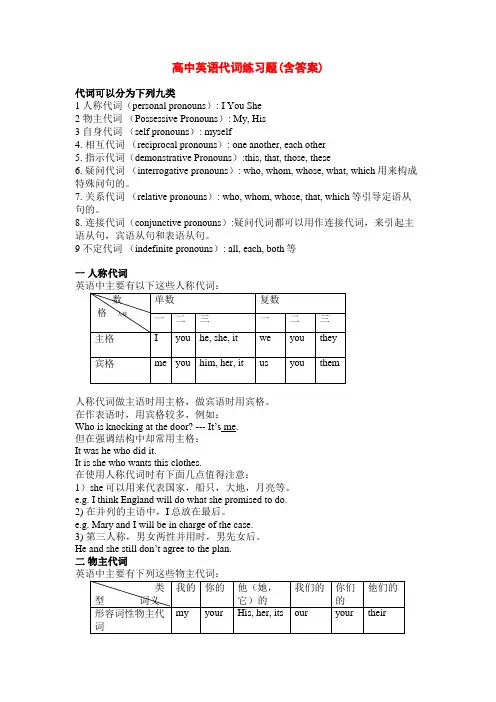
高中英语代词练习题(含答案)代词可以分为下列九类1 人称代词(personal pronouns): I You She2 物主代词(Possessive Pronouns): My, His3 自身代词(self pronouns): myself4. 相互代词(reciprocal pronouns): one another, each other5. 指示代词(demonstrative Pronouns):this, that, those, these6. 疑问代词(interrogative pronouns): who, whom, whose, what, which用来构成特殊问句的。
7. 关系代词(relative pronouns): who, whom, whose, that, which等引导定语从句的。
8. 连接代词(conjunctive pronouns):疑问代词都可以用作连接代词,来引起主语从句,宾语从句和表语从句。
9 不定代词(indefinite pronouns): all, each, both等一人称代词人称代词做主语时用主格,做宾语时用宾格。
在作表语时,用宾格较多,例如:Who is knocking at the door? --- It’s me.但在强调结构中却常用主格:It was he who did it.It is she who wants this clothes.在使用人称代词时有下面几点值得注意:1)she可以用来代表国家,船只,大地,月亮等。
e.g. I think England will do what she promised to do.2) 在并列的主语中,I总放在最后。
e.g. Mary and I will be in charge of the case.3) 第三人称,男女两性并用时,男先女后。
He and she still don’t agree to the plan.二物主代词1.1)表语Whose dictionary is this? ----it’s mine.2) 主语Ours is a big family.3) 宾语Let’s clean their room first and ours later.2. “of +名词性物主代词”可用作定语That car of hers is always breaking down.= Her car is …….三11)作宾语I can’t express myself in English.2) 作表语I am not quite myself these days. 我近来身体不大舒服。
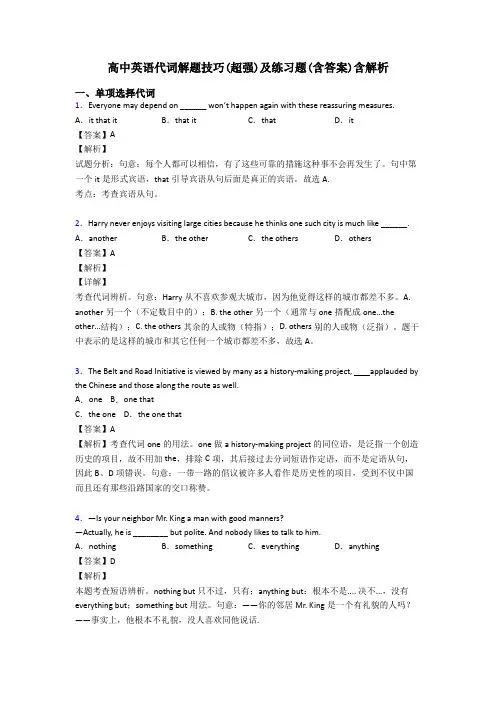
高中英语代词解题技巧(超强)及练习题(含答案)含解析一、单项选择代词1.Everyone may depend on ______ won’t happen again with these reassuring measures.A.it that it B.that it C.that D.it【答案】A【解析】试题分析:句意:每个人都可以相信,有了这些可靠的措施这种事不会再发生了。
句中第一个it是形式宾语,that引导宾语从句后面是真正的宾语。
故选A.考点:考查宾语从句。
2.Harry never enjoys visiting large cities because he thinks one such city is much like ______. A.another B.the other C.the others D.others【答案】A【解析】【详解】考查代词辨析。
句意:Harry从不喜欢参观大城市,因为他觉得这样的城市都差不多。
A. another另一个(不定数目中的);B. the other另一个(通常与one搭配成one…the other…结构);C. the others其余的人或物(特指);D. others别的人或物(泛指)。
题干中表示的是这样的城市和其它任何一个城市都差不多,故选A。
3.The Belt and Road Initiative is viewed by many as a history-making project, applauded by the Chinese and those along the route as well.A.one B.one thatC.the one D.the one that【答案】A【解析】考查代词one的用法。
one做a history-making project的同位语,是泛指一个创造历史的项目,故不用加the,排除C项,其后接过去分词短语作定语,而不是定语从句,因此B、D项错误。
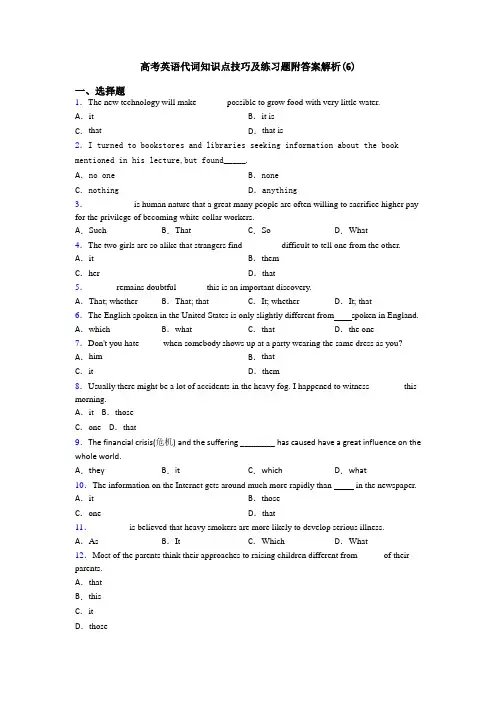
高考英语代词知识点技巧及练习题附答案解析(6)一、选择题1.The new technology will make ______ possible to grow food with very little water.A.it B.it isC.that D.that is2.I turned to bookstores and libraries seeking information about the book mentioned in his lecture,but found_____.A.no one B.noneC.nothing D.anything3.__________ is human nature that a great many people are often willing to sacrifice higher pay for the privilege of becoming white-collar workers.A.Such B.That C.So D.What4.The two girls are so alike that strangers find ________ difficult to tell one from the other. A.it B.themC.her D.that5.______ remains doubtful ______ this is an important discovery.A.That; whether B.That; that C.It; whether D.It; that6.The English spoken in the United States is only slightly different from spoken in England. A.which B.what C.that D.the one7.Don't you hate _____when somebody shows up at a party wearing the same dress as you? A.him B.thatC.it D.them8.Usually there might be a lot of accidents in the heavy fog. I happened to witness _______ this morning.A.it B.thoseC.one D.that9.The financial crisis(危机) and the suffering ________ has caused have a great influence on the whole world.A.they B.it C.which D.what10.The information on the Internet gets around much more rapidly than in the newspaper. A.it B.thoseC.one D.that11.________ is believed that heavy smokers are more likely to develop serious illness.A.As B.It C.Which D.What12.Most of the parents think their approaches to raising children different from _____ of their parents.A.thatB.thisC.itD.those13.(2014·全国大纲卷)I think Mrs. Stark could be _______ between 50 and 60 years of age. A.anywhere B.anybodyC.anyhow D.anything14.The population of China is larger than ________ of the United States.A.this B.thatC.these D.those15.I’d appreciate _________ if you would like to teach me how to use the expression once more and I always appreciate _________ me with my English in the past.A.that; you to help B.this; your helpingC.it; you to help D.it; your helping16.To qualify for the job, .A.a high school diploma is needed B.it is required that one has a high school diploma C.one needs a high school diploma D.a diploma from high school is necessary17.Behind this shop lies a nonprofit organization, ____helping survivors of drug and alcohol addiction, violence and other horrible experiences.A.one B.the one C.that D.which18.The autobiography(自传) of the happiest man would not be a record of sensational or exciting experiences, but ________ composed of simple and plain incidents or routines.A.it is B.which is C.one that D.one19.Not everybody agrees to the plan. Some support it, while I am one of ______opposed to it. A.who B.those whoC.which D.those20.Did _______ ever occur to you that you would end up in prison if you continued behaving like that?A.what B.which C.that D.it21.___________is said that the technology behind RealCine is virtual reality.A.It B.That C.What D.This22.I would appreciate____________ if you could help me out when I am in trouble.A.that B.one C.it D.this23.In my opinion, there’s no greater happiness than of succeeding in one’s career.A.one B.itC.that D.those二、1324.---Would you like some chicken?---Yes, please. It's my favourite. I think is more delicious than chicken.A.anything B.somethingC.nothing D.everything25.Some experts state_____ seems that increased student focus can increase confidence and reduce the tendency among students to be anxious.A.it B./C.that D.what【参考答案】***试卷处理标记,请不要删除一、选择题1.A解析:A【解析】A[it 作形式宾语,真正的宾语是后面的 to grow food with very little water。
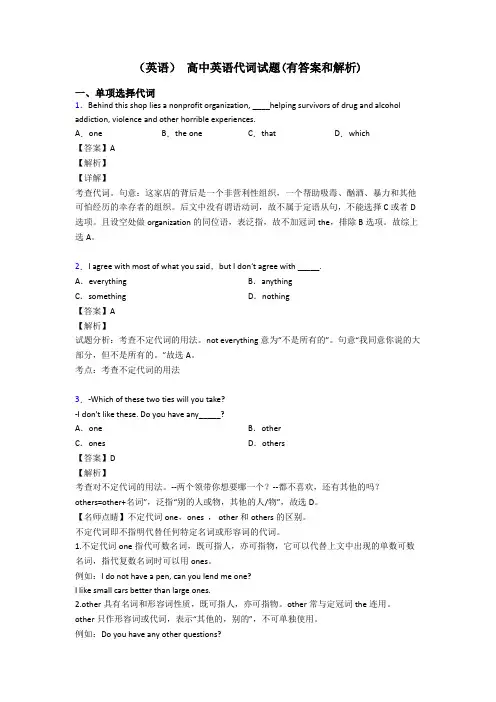
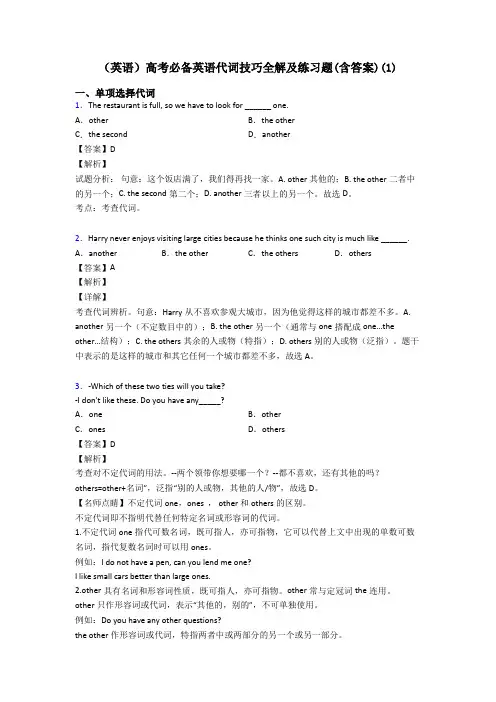
(英语)高考必备英语代词技巧全解及练习题(含答案)(1)一、单项选择代词1.The restaurant is full, so we have to look for ______ one.A.other B.the otherC.the second D.another【答案】D【解析】试题分析:句意:这个饭店满了,我们得再找一家。
A. other其他的;B. the other二者中的另一个;C. the second第二个;D. another三者以上的另一个。
故选D。
考点:考查代词。
2.Harry never enjoys visiting large cities because he thinks one such city is much like ______. A.another B.the other C.the others D.others【答案】A【解析】【详解】考查代词辨析。
句意:Harry从不喜欢参观大城市,因为他觉得这样的城市都差不多。
A. another另一个(不定数目中的);B. the other另一个(通常与one搭配成one…the other…结构);C. the others其余的人或物(特指);D. others别的人或物(泛指)。
题干中表示的是这样的城市和其它任何一个城市都差不多,故选A。
3.-Which of these two ties will you take?-I don't like these. Do you have any_____?A.one B.otherC.ones D.others【答案】D【解析】考查对不定代词的用法。
--两个领带你想要哪一个?--都不喜欢,还有其他的吗?others=other+名词”,泛指“别的人或物,其他的人/物”,故选D。
【名师点睛】不定代词one,ones , other 和others的区别。
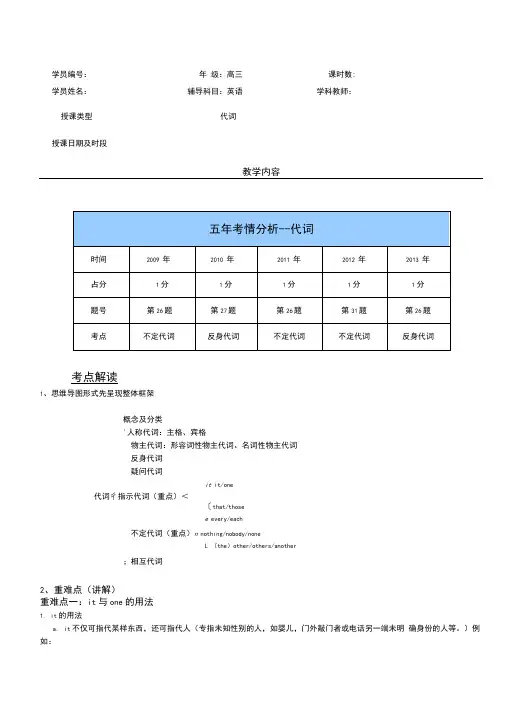
学员编号:年级:高三课时数:学员姓名:辅导科目:英语学科教师:授课类型代词授课日期及时段教学内容考点解读1、思维导图形式先呈现整体框架概念及分类'人称代词:主格、宾格物主代词:形容词性物主代词、名词性物主代词反身代词疑问代词it it/one代词彳指示代词(重点)<〔that/thosee every/each不定代词(重点)n nothing/nobody/noneL (the)other/others/another;相互代词2、重难点(讲解)重难点一:it与one的用法1.it的用法a.it不仅可指代某样东西,还可指代人(专指未知性别的人,如婴儿,门外敲门者或电话另一端未明确身份的人等。
)例如:Is it a boy or a girl? It's a girl.Someone is ringing the doorbell. Go and see who it is.b.it可指代时间、季节、地点、天气、距离、金钱等。
例如:I hope it is spring all the year round.It is no far from the school to my home.c.it用作形式主语或形式宾语。
例如:It is certain that food prices are going up.She soon found it possible to go to the fitness club regularly.2.one的用法one是不定代词,可代替前面出现的某个可数名词,复数为ones。
例如:I would like to have a digital camera, but I can 't afford one.There are only hard chocolates left; we ve eaten all the soft ones.重难点二:that与those的用法that替代被限定的、有定语修饰的名词;that可替代可数名词单数或不可数名词,指代可数名词复数时用those。
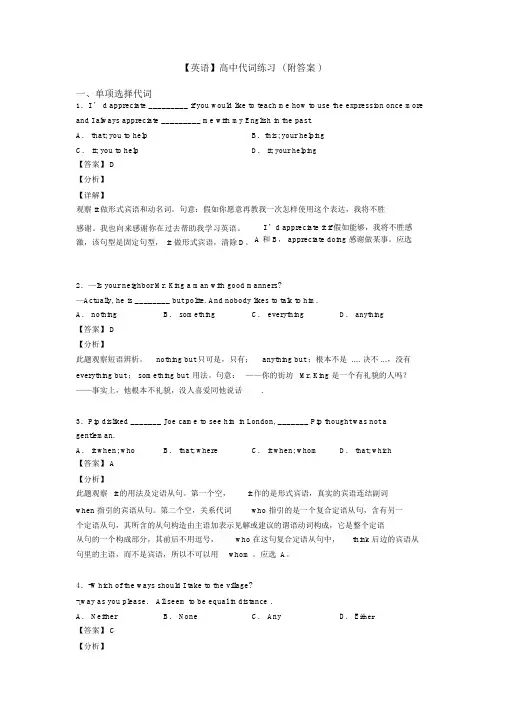
【英语】高中代词练习 ( 附答案 )一、单项选择代词1.I ’ d appreciate _________ if you would like to teach me how to use the expression once more and I always appreciate _________ me with my English in the past.A. that; you to help B.this; your helpingC. it; you to help D. it; your helping【答案】 D【分析】【详解】观察 it 做形式宾语和动名词。
句意:假如你愿意再教我一次怎样使用这个表达,我将不胜感谢。
我也向来感谢你在过去帮助我学习英语。
激,该句型是固定句型,it 做形式宾语,清除D。
I ’d appreciate it if假如能够,我将不胜感A 和 B, appreciate doing 感谢做某事。
应选2.—Is your neighbor Mr. King a man with good manners?—Actually, he is ________ but polite. And nobody likes to talk to him.A. nothing B. something C. everything D. anything【答案】 D【分析】此题观察短语辨析。
nothing but 只可是,只有;anything but :根本不是 .... 决不 ...,没有everything but ; something but 用法。
句意:——你的街坊Mr. King 是一个有礼貌的人吗?——事实上,他根本不礼貌,没人喜爱同他说话.3.Pip disliked _______ Joe came to see him in London, _______ Pip thought was not a gentleman.A. it when; who B. that; where C. it when; whom D. that; which【答案】 A【分析】此题观察it 的用法及定语从句。
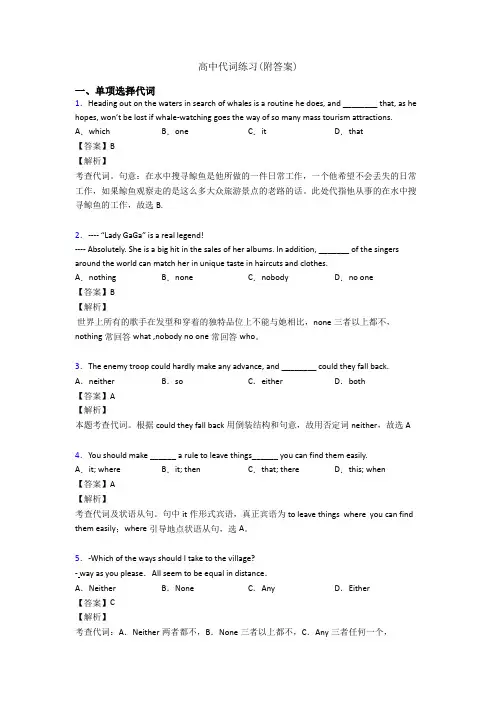
高中代词练习(附答案)一、单项选择代词1.Heading out on the waters in search of whales is a routine he does, and ________ that, as he hopes, won’t be lost if whale-watching goes the way of so many mass tourism attractions. A.which B.one C.it D.that【答案】B【解析】考查代词。
句意:在水中搜寻鲸鱼是他所做的一件日常工作,一个他希望不会丢失的日常工作,如果鲸鱼观察走的是这么多大众旅游景点的老路的话。
此处代指他从事的在水中搜寻鲸鱼的工作,故选B.2.---- “Lady GaGa” is a real legend!---- Absolutely. She is a big hit in the sales of her albums. In addition, _______ of the singers around the world can match her in unique taste in haircuts and clothes.A.nothing B.none C.nobody D.no one【答案】B【解析】世界上所有的歌手在发型和穿着的独特品位上不能与她相比,none三者以上都不,nothing常回答what ,nobody no one常回答who。
3.The enemy troop could hardly make any advance, and ________ could they fall back. A.neither B.so C.either D.both【答案】A【解析】本题考查代词。
根据could they fall back用倒装结构和句意,故用否定词neither,故选A4.You should make ______ a rule to leave things______ you can find them easily.A.it; where B.it; then C.that; there D.this; when【答案】A【解析】考查代词及状语从句。
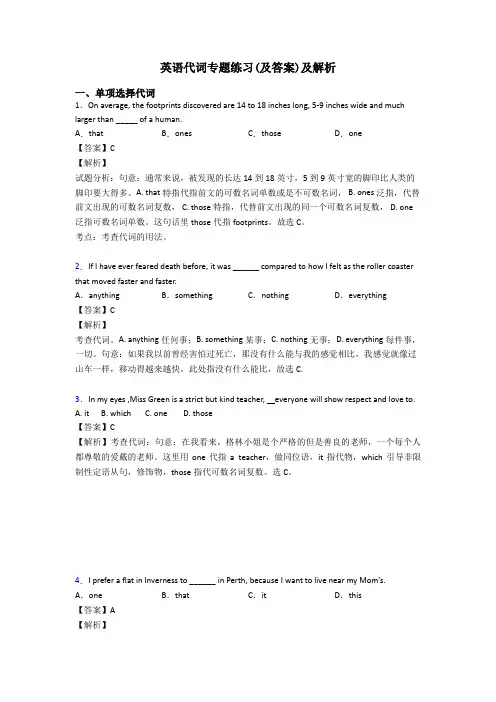

(英语)英语代词练习题及答案含分析一、单项选择代词1.-Which of these two ties will you take?-I don't like these. Do you have any_____?A. one B.otherC. ones D. others【答案】 D【分析】考不定代的用法。
--两个你想要哪一个?--都不喜,有其余的?others=other+ 名”,泛指“ 的人或物,其余的人/ 物”,故 D。
【名点睛】不定代one ,ones , other 和 others 的区。
不定代即不指明朝替任何特命名或形容的代。
1.不定代one 指代可数名,既可指人,亦可指物,它能够取代上文中出的数可数名,指代复数名能够用ones。
比如: I do not have a pen, can you lend me one?I like small cars better than large ones.2.other 具闻名和形容性,既可指人,亦可指物。
other 常与定冠the 用。
other 只作形容或代,表示“其余的,的”,不行独使用。
比如: Do you have any other questions?the other 作形容或代,特指二者中或两部分的另一个或另一部分。
3.others 相当于“ other+名”,泛指“ 的人或物”,只闻名性用法。
比如: Some are planting trees, others are watering them.2.“ Made in China 2025 ” aims to transform China from a product-making factory into a product-making power, ______________ driven by innovation and emphasizing quality over quantity. A. the one that B.one thatC. one D. the one【答案】 C【分析】【解】考代的用法。
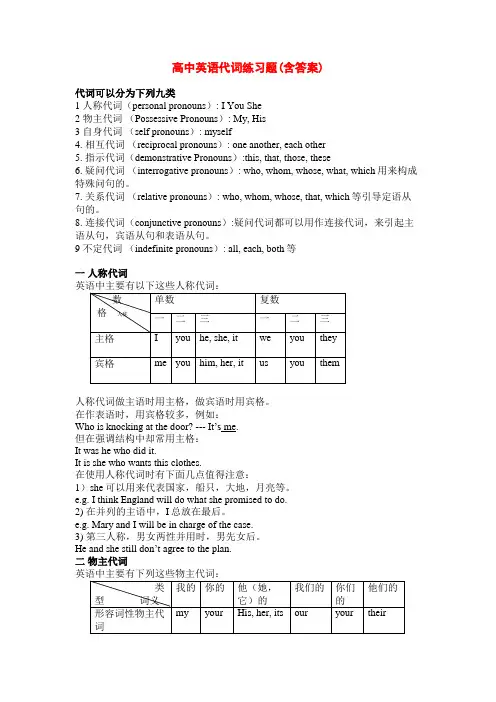
高中英语代词练习题(含答案)代词可以分为下列九类1 人称代词(personal pronouns): I You She2 物主代词(Possessive Pronouns): My, His3 自身代词(self pronouns): myself4. 相互代词(reciprocal pronouns): one another, each other5. 指示代词(demonstrative Pronouns):this, that, those, these6. 疑问代词(interrogative pronouns): who, whom, whose, what, which用来构成特殊问句的。
7. 关系代词(relative pronouns): who, whom, whose, that, which等引导定语从句的。
8. 连接代词(conjunctive pronouns):疑问代词都可以用作连接代词,来引起主语从句,宾语从句和表语从句。
9 不定代词(indefinite pronouns): all, each, both等一人称代词人称代词做主语时用主格,做宾语时用宾格。
在作表语时,用宾格较多,例如:Who is knocking at the door? --- It’s me.但在强调结构中却常用主格:It was he who did it.It is she who wants this clothes.在使用人称代词时有下面几点值得注意:1)she可以用来代表国家,船只,大地,月亮等。
e.g. I think England will do what she promised to do.2) 在并列的主语中,I总放在最后。
e.g. Mary and I will be in charge of the case.3) 第三人称,男女两性并用时,男先女后。
He and she still don’t agree to the plan.二物主代词1.1)表语Whose dictionary is this? ----it’s mine.2) 主语Ours is a big family.3) 宾语Let’s clean their room first and ours later.2. “of +名词性物主代词”可用作定语That car of hers is always breaking down.= Her car is …….三11)作宾语I can’t express myself in English.2) 作表语I am not quite myself these days. 我近来身体不大舒服。
代词(一)Part1人称代词人称代词是表示"我"、"你"、"他"、"她"、"它"、"我们"、"你们"、"他们"的词。
是表示自身或人称的代词。
(::I置于Part2物主代词表示所有关系的代词叫做物主代词。
1物主代词可分为形容词性物主代词和名词性物主代词两种。
(1)形容词物主代词在句中作定语:Ilovemycountry.Isthisyourcar?(2)名词性的物主代词可用作主语,宾语,表语以及与"of"连接:物的代词。
主要的有this,that,these,those,其中this和that 为单数,these和those为复数。
指示代词在句中可作主语、宾语、表语、定语。
指示代词的用法:1this和that的用法两者的基本区别是this表近指,that表远指。
另外,当要回指上文提到的事情时,可用this或that,但是若要指下文叙述的事情,通常要用this:ShemarriedJim,andthis/thatsurprisedme.Iwanttoknowthis——Doseheloveher?2that和those的用法that和those常常用来代替已提到过的名词,以避免重复。
ThepopulationofChinaislargerthanthatofJapan.Theearsofarabbitarelongerthanthoseofafox.Part5相互代词相互代词是表示相互关系的代词,主要有who的意义为“谁”,既可以做单数,也可以指复数。
在句中主要做主语和宾语。
whom是who的宾格,在句中主要做动词宾语和介词宾语,做动词宾语时whom可与who互换使用,但作介词宾语时只能用whom;whose是who的所有格形式,意为“谁的”:Whosaidthat?Whomareyouwaitingfor?Whom/Whohaveyouchosentotakepartinthesportsmeet?Idon’tknowwhoseitis.what与whichwhich和what都指物。
(英语)高中英语代词常见题型及答题技巧及练习题(含答案)含解析一、单项选择代词1.To their great surprise, they found ________ in the meeting.A.they were not understanding B.themselves not understoodC.they had not understood D.themselves not understanding【答案】B【解析】B 考查语态。
这里oneself和后面的动词是被动关系,所以应该用过去分词。
find oneself done发现自己被……,故选B。
2.I hate _______ when people eat with their mouths full.A.that B.these C.it D.them【答案】C【解析】【详解】考查代词。
句意:我讨厌人们吃东西时嘴里塞满东西。
表示爱憎类的动词如:like/love/hate/dislike或appreciate, rely on和see to等其后加宾语从句时,此时一般先用it 做其形式宾语,其后再接that/when等引导的宾语从句。
故选C。
【点睛】it作形式宾语一般有以下三种情况1. 谓语动词appreciate, dislike, like, hate, love, make (按时到达,成功)等后接由if或when 等引导的宾语从句时,往往在前面加上形式宾语it。
I would appreciate it if you could come to my birthday party.2. 动词have(表明,坚持说),take(认为,猜想),hide(隐藏),publish(公布),put(表达,写出来)等后接由that引导的宾语从句时,往往在从句的前面加上形式宾语。
I take it that you will be leaving Shanghai soon.我认为你不久就离开上海。
高中代词练习(附答案)一、单项选择代词1.The river was once with fishes, but now we find as a result of pollution.A.alive, none B.lively, nothing C.live, none D.living, nothing【答案】A【解析】【详解】考查形容词和代词。
句意:这条河中曾经生长着各种各样的鱼,但是现在,由于污染,我们一条鱼也看不到了。
第一个空用be alive with表示“充满着……”;第二个空用none表示数量概念,指代上文提到的人或物,此处指上文提到的“鱼”,意为“一条鱼也没有”。
nothing 表示“什么也没有”,不合题意。
故选A。
【点睛】alive, living, live和lively比较:alive是表语形容词,作“活着的”,“在世的”解,它既可以修饰人也可以修饰物;living意为“活着的”,主要用作定语,常置于名词之前,有时也可置于名词之后。
也可用作表语;live意为“活着的”,可以作定语,放在所修饰的名词之前,一般不用来修饰人;lively意为“生动的”,“活泼的”,“充满生气的”,用作表语或定语,可以用来修饰人或物。
2.—The exam was easy, wasn’t it?—Yes, but I don’t think ______ could pass it.A.somebody B.anybodyC.everybody D.nobody【答案】C【解析】本题考查不定代词的用法,somebody某人;anybody任何人;everybody每人;nobody没人。
根据句意,可知选C。
句意:--这场考试很简单,不是吗? -- 是的,但我认为不是每个人都能通过。
3.Jack Ma, the founder and chairman of China’s Alibaba Group, has a $28.6 billion fortune,______making him the richest person in China.A.it B.one C.that D.which【答案】B【解析】【详解】试题分析:考查代词。
(英语)高中英语代词解题技巧讲解及练习题(含答案)含解析一、单项选择代词1.–– Which of the two drivers is to blame for the accident? ––______. It’s the cyclist’s fault. A.Both B.All C.None D.Neither【答案】D【解析】试题分析:句意:—两个司机中谁对这次事故负责? –都不是。
这是骑自行车人的错。
A. Both两个都; B. All三者以上都;C. None三者以上都不;D. Neither两者都不,故选D。
考点:考查代词。
2.Praise is like sunlight to the human spirit; without _______ we cannot flower and grow. A.them B.it C.that D.which【答案】B【解析】【详解】考查代词。
句意:赞美就像人类精神的阳光;没有它,我们就不能开花和生长。
分析句子可知,without后接宾语praise,用it代替。
故选B项。
3.While e-book sales this year have declined, it is still important for us to remember that the figures are still higher than ______ five years ago.A.one B.thatC.those D.they【答案】C【解析】句意:尽管今年电子书的销量已经下降,但是对于我们来说记住数字仍然高于五年前的销售量仍然很重要。
这里用代词those指代上文出现过的可数名词复数figures,故选C。
【名师点睛】代词that和those用法:一、代词that 的用法:代词that 的指代为特指,并且我们通常归纳为“同物异指”,即代词that 指代的物体与前文中的物体是同样的名称,但是有不同的内涵,另外代词that 可以指代前文中的不可数名词,The climate of Jilin is not so mild as that of Jiangsu. 吉林的气候不如江苏温和。
高中英语代词练习题(含答案)代词可以分为下列九类1 人称代词(personal pronouns): I You She2 物主代词(Possessive Pronouns): My, His3 自身代词(self pronouns): myself4. 相互代词(reciprocal pronouns): one another, each other5. 指示代词(demonstrative Pronouns):this, that, those, these6. 疑问代词(interrogative pronouns): who, whom, whose, what, which用来构成特殊问句的。
7. 关系代词(relative pronouns): who, whom, whose, that, which等引导定语从句的。
8. 连接代词(conjunctive pronouns):疑问代词都可以用作连接代词,来引起主语从句,宾语从句和表语从句。
9 不定代词(indefinite pronouns): all, each, both等一人称代词人称代词做主语时用主格,做宾语时用宾格。
在作表语时,用宾格较多,例如:Who is knocking at the door? --- It’s me.但在强调结构中却常用主格:It was he who did it.It is she who wants this clothes.在使用人称代词时有下面几点值得注意:1)she可以用来代表国家,船只,大地,月亮等。
e.g. I think England will do what she promised to do.2) 在并列的主语中,I总放在最后。
e.g. Mary and I will be in charge of the case.3) 第三人称,男女两性并用时,男先女后。
He and she still don’t agree to the plan.二物主代词1.1)表语Whose dictionary is this? ----it’s mine.2) 主语Ours is a big family.3) 宾语Let’s clean their room first and ours later.2. “of +名词性物主代词”可用作定语That car of hers is always breaking down.= Her car is …….三11)作宾语I can’t express myself in English.2) 作表语I am not quite myself these days. 我近来身体不大舒服。
代词代词可以分为下列九类1 人称代词2 物主代词3 自身代词4. 相互代词5. 指示代词6. 疑问代词7. 关系代词8. 连接代词9 不定代词人称代词做主语时用主格,做宾语时用宾格。
在作表语时,用宾格较多,例如:Who is knocking at the door? --- It’s me.但在强调结构中却常用主格:It was he who did it.. It is she who wants this clothes.在使用人称代词时有下面几点值得注意:1)she可以用来代表国家,船只,大地,月亮等。
e.g. I think England will do what she promised to do.2) 在并列的主语中,I总放在最后。
e.g. Mary and I will be in charge of the case.3) 第三人称,男女两性并用时,男先女后。
He and she still don’t agree to the plan.二物主代词1.1)表语Whose dictionary is this? ----it’s mine.2) 主语Ours is a big family.3) 宾语Let’s clean their room first and ours later.2. “of +名词性物主代词”可用作定语That car of hers is always breaking down.= Her car is …….三自(反)身代词1.这些词可用来:1)作宾语I can’t express myself in English.2) 作表语I am not quite myself these days. 我近来身体不大舒服。
3)作主语或宾语的同位语The theory itself is all right.在作同位语时,自身代词常译作“本人”或“亲自”They must make investigation themselves.他们必须亲自作调查。
与by oneself较难区分By oneself 译为“一个人干(不要别人帮助)”They made the machine all by themselves. 这机器完全是他们自己制造的。
2.自身代词常和某些动词连用Enjoy oneself, behave oneself(使自己举止良好),help yourself to sth. 请吃点。
Come to oneself苏醒3.常与某些介词连用By oneself 一个人做(不要别人帮助)For oneself替自己,自己He has a right to decide for himself. 他有权自己决定。
In oneself 本身This is not a bad idea in itself. 这主意本身并不错。
To oneself供自己用She had a room to herself.她自己住一间房。
四相互代词One another与each other由于表示相互关系,称为相互代词,两者的用法是差不多的。
We can help one another (each other).We are eager to learn from each other.我们都急欲向彼此学习。
五指示代词有this, that, these, those.注意:1.前面刚提到的东西,英语中常用that (或those)表示,而汉语中却常用这表示。
e.g. We have no time to do it. That’s our trouble.我们没有时间做这事。
这就是我们的问题。
2. 指下面要谈到的事物时,常用this, 例如I want to know this: has John been here?3 those在下面的这种类型的句子里常出现,表示人们或东西(后面多有一定定语修饰)Those who wish to go to the concert may sign up here.He was among those who attended it. 他是到会人之一。
六疑问代词有who, whom, whose, what, which都是来构成特殊问句的。
Who通常做主语和表语,whom做宾语。
1 what, who 一般来说,what 问的是职业或地位,who问的是姓名。
----What was her husband?---- He was a lawyer.比较---- who was her husband?----- He was John Smith, the son of a famous writer.2 which, what Which用于已知情况的选择,其后可以跟of, 而what用于未知情况的疑问,其后不能跟of.What fruit do you like best?Which do you like better, oranges or apples?3 在以这类代词做主语时,后面的动词可以用复数形式,也可以用单数形式,要看所代表的人或物是复数还是单数来决定。
e.g. Who live(s) in this room?如果不清楚代表的东西是复数还是单数,则动词多用单数形式。
-----What’s there on the desk?----- There’re some books on it.七关系代词:关系代词有who, whom, whose, that, which,是用来引起定语从句的。
它一面代表定语从句所修饰的那个名词(或代词),一面又在从句内担任一个成分。
举例问学生:The worker who invented the machine is now studying at Qinghua University.Who指这个工人,在从句中做主语。
He is no longer the man that he was. That指这个man, 在从句中做表语。
1.Who, whom 。
Who, whom代表人,在从句中做主语时用who, 做宾语时用whom.The girl who spoke is my best friend.I want to find someone with whom I can discuss such things.2 whose。
代表“某个人的”,在从句中做定语。
Do you know anyone whose family is in Xi’an?3. which 代表事物,在从句中可以用作主语和宾语。
He told a story which moved us deeply.4 that代表事物的时候更多些,也可代表人,在从句中做主语,宾语,表语。
需要注意以下几点:1.在先行词是anything, all, much等词的句子中,多用that,不要用which.I never took anything that didn’t belong to me.2. 定语从句有限制性和非限制性两种,在限制性定语从句中,如果前面紧挨着介词,则不能用that.He is a man from whom we are all ready to learn.3. 在非限制性定从中,不能用that, 只能用who, whom代表人,用which代表物。
My sister, who is a nurse, came home for a few days.在这种从句中,which有时可代表前面说的整个情况或主句的某一部分,而不只代表一个词。
He failed his exam, which proves that he wasn’t working hard enough.八连接代词:疑问代词都可以用作连接代词,来引起主语从句,宾语从句和表语从句。
e.g. It is not decided who will hold the meeting?Do you know whose pen it is?The question is whom I should trust.1 代词what有时可以用来表示the thing which这种意思。
What (the thing which) she lacks is experience.We should never pretend to know what we don’t know. (这里常出现that这个迷惑项。
)2 who(m), which, what可以和ever构成合成词,和前面所提到的疑问代词一样,引导主从或宾从。
(也就是whatever, whichever, whoever的用法)Whatever he did was right.Whoever makes mistakes must correct them.九不定代词:英语中有下面这些不定代词:all, each, every, both, either, neither, one, none, little, few, many, much, other, another, some, any, no.以及一些复合不定代词,如:anyone, anybody, anything, someone, somebody, something, everyone, everything, nobody, nothing.1 none, no one, nothing的用法区别(1)none即可指人,也可指物,且一定是特指,常用来回答how many/much引导的疑问句;no one只能指人,而且只能是泛指概念,常来回答who引导的疑问句;nothing侧重于物,常用来回答what引导的疑问句。
----How many people are there in the room?----- None. (问学生)――Who is in the room?----- No one./nobody.(2) none后面可加of引导的介词短语,而something, anything, everything, nothing, someone….却不能。
(3)none后面的谓语用什么?单数还是复数。
答:none做主语时,如果侧重所有人的情况,动词多用复数,如果侧重每个人的情况,动词用单数。
None of us are perfect.我们都不是完人。
None of us has got a bike. 我们谁都没有自行车。